Unit 10 I've had this bike for three years.Section B 2a-2e课件(共42张PPT)
文档属性
| 名称 | Unit 10 I've had this bike for three years.Section B 2a-2e课件(共42张PPT) | 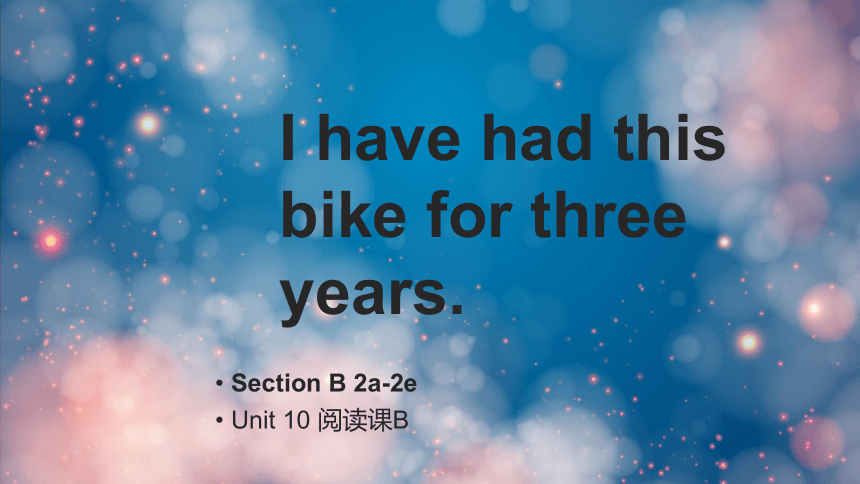 | |
| 格式 | pptx | ||
| 文件大小 | 15.0MB | ||
| 资源类型 | 教案 | ||
| 版本资源 | 人教新目标(Go for it)版 | ||
| 科目 | 英语 | ||
| 更新时间 | 2022-06-04 22:15:09 | ||
图片预览

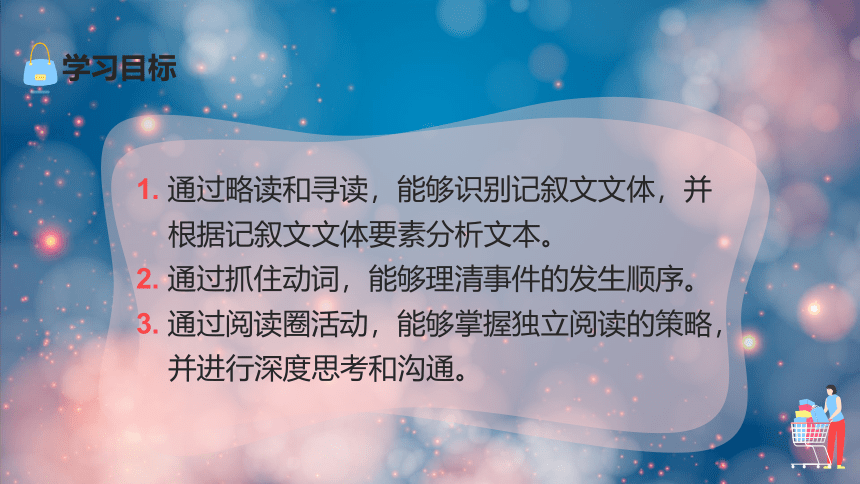

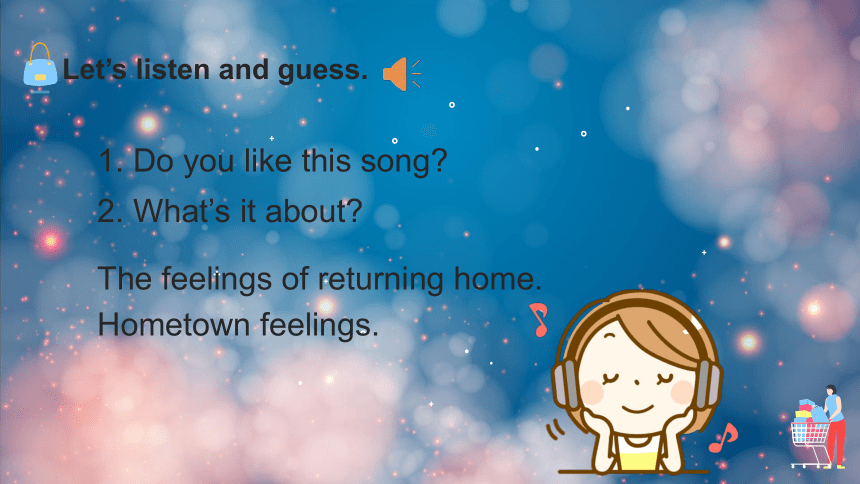
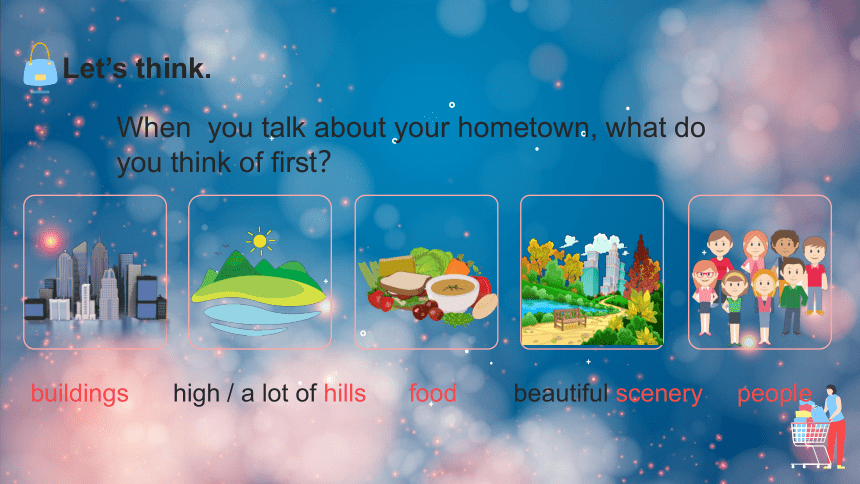
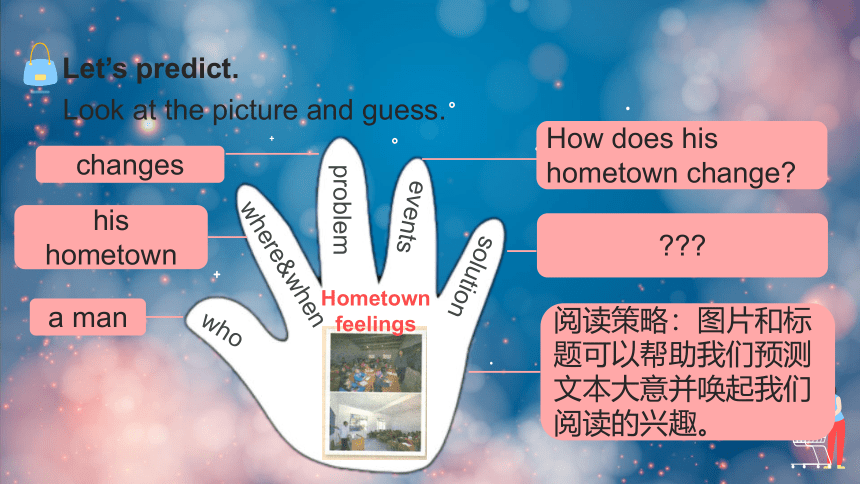

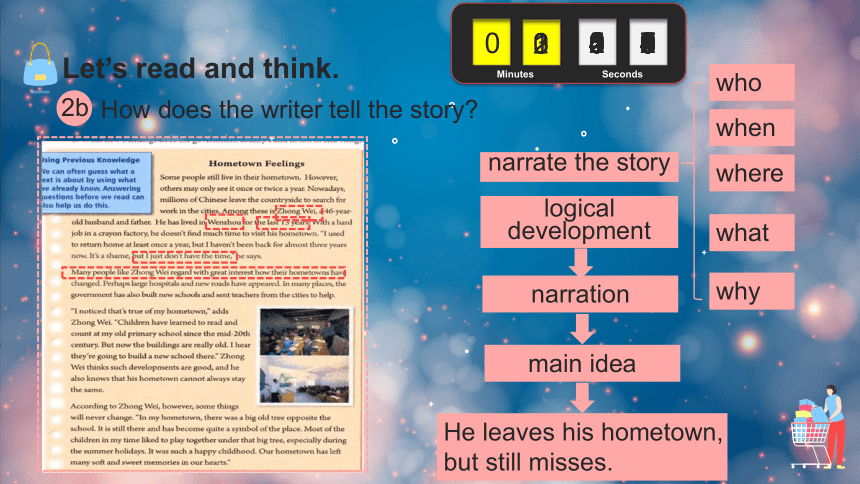
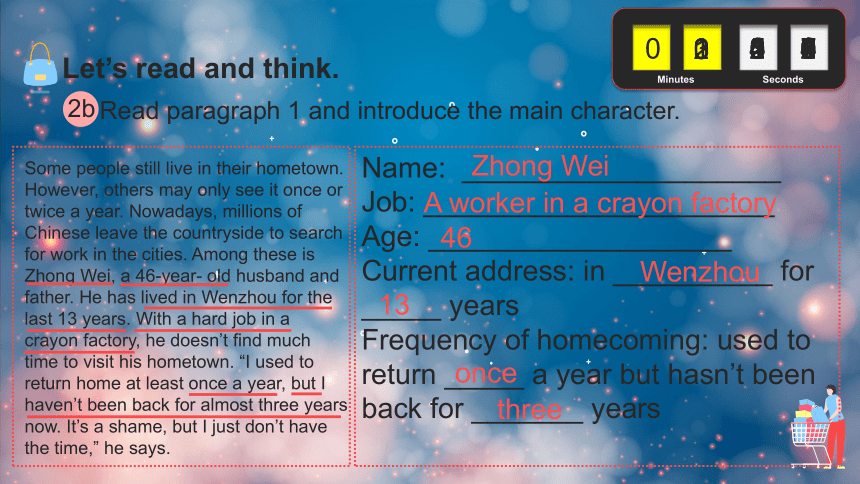

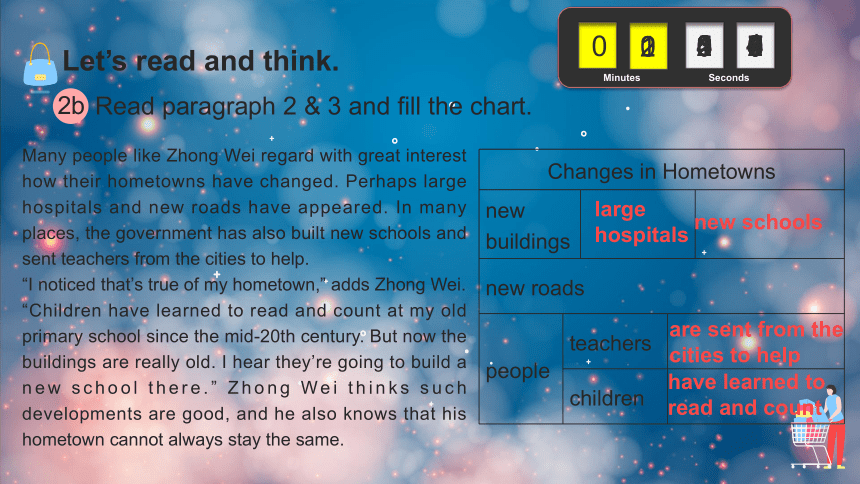
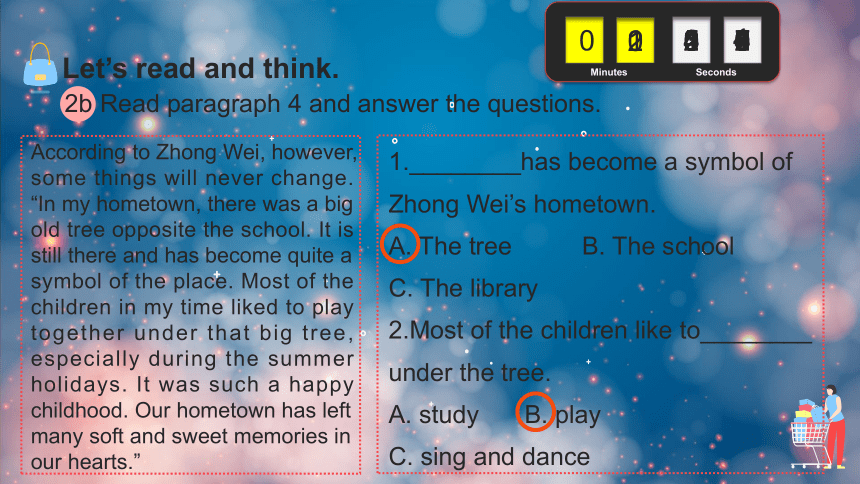
文档简介
(共42张PPT)
Section B 2a-2e
Unit 10 阅读课B
I have had this bike for three years.
学习目标
1. 通过略读和寻读,能够识别记叙文文体,并 根据记叙文文体要素分析文本。
2. 通过抓住动词,能够理清事件的发生顺序。
3. 通过阅读圈活动,能够掌握独立阅读的策略, 并进行深度思考和沟通。
Pre-reading
part 1
1. Do you like this song
2. What’s it about
Let’s listen and guess.
The feelings of returning home.
Hometown feelings.
Let’s think.
When you talk about your hometown, what do you think of first?
buildings
high / a lot of hills
food
beautiful scenery
people
Let’s predict.
who
problem
events
solution
where&when
a man
his hometown
changes
How does his hometown change
阅读策略:图片和标题可以帮助我们预测文本大意并唤起我们阅读的兴趣。
Look at the picture and guess.
Hometown feelings
While-reading
part 2
Let’s read and think.
2b
How does the writer tell the story
narration
narrate the story
who
when
where
why
what
He leaves his hometown, but still misses.
main idea
logical
development
Minutes
Seconds
0
0
3
4
3
2
8
7
6
5
1
2
1
0
9
5
3
0
1
2
4
4
3
2
8
7
6
5
1
0
9
5
3
0
1
2
4
4
3
2
8
7
6
5
1
0
9
5
3
0
1
2
4
Let’s read and think.
2b
Read paragraph 1 and introduce the main character.
Minutes
Seconds
0
0
3
4
3
2
8
7
6
5
1
2
1
0
9
5
3
0
1
2
4
4
3
2
8
7
6
5
1
0
9
5
3
0
1
2
4
4
3
2
8
7
6
5
1
0
9
5
3
0
1
2
4
Name: ____________________
Job: ______________________
Age: ___________________
Current address: in __________ for _____ years
Frequency of homecoming: used to return _____ a year but hasn’t been back for _______ years
Some people still live in their hometown. However, others may only see it once or twice a year. Nowadays, millions of Chinese leave the countryside to search for work in the cities. Among these is Zhong Wei, a 46-year- old husband and father. He has lived in Wenzhou for the last 13 years. With a hard job in a crayon factory, he doesn’t find much time to visit his hometown. “I used to return home at least once a year, but I haven’t been back for almost three years now. It’s a shame, but I just don’t have the time,” he says.
Zhong Wei
A worker in a crayon factory
46
Wenzhou
13
once
three
Let’s think.
Why do millions of Chinese leave the countryside every year
If you were one of them, would you leave your hometown Why
For work
For study
For money
For a dream …
Read paragraph 2 & 3 and fill the chart.
Let’s read and think.
2b
Many people like Zhong Wei regard with great interest how their hometowns have changed. Perhaps large hospitals and new roads have appeared. In many places, the government has also built new schools and sent teachers from the cities to help.
“I noticed that’s true of my hometown,” adds Zhong Wei. “Children have learned to read and count at my old primary school since the mid-20th century. But now the buildings are really old. I hear they’re going to build a new school there.” Zhong Wei thinks such developments are good, and he also knows that his hometown cannot always stay the same.
Minutes
Seconds
0
0
4
3
2
8
7
6
5
1
2
1
0
9
5
3
0
1
2
4
4
3
2
8
7
6
5
1
0
9
5
3
0
1
2
4
Changes in Hometowns new buildings
new roads people teachers children large hospitals
new schools
are sent from the
cities to help
have learned to read and count
Let’s read and think.
2b
Read paragraph 4 and answer the questions.
Minutes
Seconds
0
0
4
3
2
8
7
6
5
1
2
1
0
9
5
3
0
1
2
4
4
3
2
8
7
6
5
1
0
9
5
3
0
1
2
4
According to Zhong Wei, however, some things will never change. “In my hometown, there was a big old tree opposite the school. It is still there and has become quite a symbol of the place. Most of the children in my time liked to play together under that big tree, especially during the summer holidays. It was such a happy childhood. Our hometown has left many soft and sweet memories in our hearts.”
1.________has become a symbol of
Zhong Wei’s hometown.
A. The tree B. The school
C. The library
2.Most of the children like to________
under the tree.
A. study B. play
C. sing and dance
Let’s read and think.
2b
Read paragraph 4 and answer the questions.
According to Zhong Wei, however, some things will never change. “In my hometown, there was a big old tree opposite the school. It is still there and has become quite a symbol of the place. Most of the children in my time liked to play together under that big tree, especially during the summer holidays. It was such a happy childhood. Our hometown has left many soft and sweet memories in our hearts.”
3.According to Zhong Wei, our hometown has left ________in our hearts.
nothing B. unhappy memories
C. sweet memories
4.What does ZhongWei want to tell the readers
Hometown is a good place wherever
we go.
Let’s read and think.
Minutes
Seconds
0
4
0
3
4
3
2
8
7
6
5
1
2
1
0
9
5
3
0
1
2
4
4
3
2
8
7
6
5
1
0
9
5
3
0
1
2
4
4
3
2
8
7
6
5
1
0
9
5
3
0
1
2
4
4
3
2
8
7
6
5
1
0
9
5
3
0
1
2
4
5
0
4
5
9
8
7
6
5
4
3
2
1
0
4
9
8
7
6
5
4
3
2
1
3
9
8
7
6
5
4
3
2
1
2
9
8
7
6
5
4
3
2
1
1
9
8
7
6
5
4
3
2
1
0
9
8
7
6
5
4
3
2
1
0
2c
Complete the summary with words from the passage. You may need to change the forms of the words.
Many Chinese people these days leave their ________ to work in the________. They usually ________ to their hometowns once or twice a ________. Zhong Wei hasn’t been back in close to three years. He has been working in a ________factory in Wenzhou for the past 13 years.
hometowns
cities
come back
year
crayon
Let’s read and think.
2c
Complete the summary with words from the passage. You may need to change the forms of the words.
People like him are ________ in how their hometowns are changing. New buildings are often built by the __________ . Zhong Wei thinks these changes are ________ because things need to change in order to become better. But he also thinks some things ________ change, and his hometown is still the place that holds all his childhood ________ .
interested
government
good
will never
memories
Let’s read and think.
Think of changes that are happening in your town or city today. Which changes are generally good Which changes could be seen as bad
Let’s read independently, think and communicate.
communicating
reading
01
02
03
thinking
Discussion Leader
Passage Person
Word Master
Summarizer
Connector
make links between the story and wider world (film, experience, photo ... )
discuss the outline with key moments and logical development
analyze the characters
prepare general questions
guide the discussion in the group
share the paragraph you feel well-written
ask the group some questions
select vocabularies that may be new, unusual, or used in an interesting way
Let’s read independently, think and communicate.
Meeting expectations
For listener
For speaker
speak loudly
make eye contact with everyone
ask for comments
listen carefully
take notes
give comments
Let’s read independently, think and communicate.
Prepare general questions.
Refer to 2c and 2d on Page 7.
Create more questions.
Guide the discussion in the group.
Discussion Leader
Read by yourself and finish the worksheet.
Let’s read independently, think and communicate.
Share the paragraph you feel well-written.
Find sentences that are difficult for you to understand.
Ask the group some questions.
Passage Person
Read by yourself and finish the worksheet.
Let’s read independently, think and communicate.
Select vocabularies that may be new, unusual, or used in an interesting way.
Can we change these words
Can you tell us the reasons
Word Master
Read by yourself and finish the worksheet.
Post-reading
part 3
Let’s create and act.
Hot Seating
Work in groups of 5-6.
One is a worker and the others are students and reporters.
Ask the worker some questions about himself or herself.
For students: ask anything about the changes of their hometowns or hometown feelings.
Work in groups to make an interview.
Let’s self-check.
学习目标 1 2 3 4 5
能够识别记叙文文体并根据记叙文文体要素分析文本。
能够掌握阅读圈独立阅读的策略,能够与同伴交流。
习题大礼包
part 4
Let’s practice.
2a
Answer the questions before you read. Then read the passage to find out if your answers are the same as the ones in the passage.
1. Why do millions of Chinese leave the countryside every year
Millions of Chinese leave the countryside to search for work in the cities.
2. How often do you think these people visit their hometowns
They may only visit their hometowns once or twice a year. Some people even have no time to return home.
Let’s practice.
2a
Answer the questions before you read. Then read the passage to find out if your answers are the same as the ones in the passage.
3. What new buildings does the government usually build in towns and villages
Large hospitals, new roads, new schools, parks and so on.
Let’s practice.
True or False
1. Zhong Wei is a 40-year-old husband and father.
2. Zhong Wei has lived in Guangzhou for more than ten years.
3. He didn’t return to his hometown last year.
4. Many new schools and large hospitals have appeared in his hometown.
F
F
T
T
Let’s practice.
True or False
5. Zhong Wei had a happy childhood in his hometown.
6. Zhong Wei is happy with the developments in his hometown.
T
T
Let’s practice.
1. look for ________ 5. go back ___________
2. consider ________ 6. changes __________
3. across from _______ 7. area ________
4. in one’s opinion ___________
2b
Find the expressions in the passage that have the similar meanings as these words and phrases.
search for
return
regard
developments
opposite
place
according to
词汇大礼包
part 5
Let’s learn and take notes.
search
“搜索,搜查” search (for sb/sth)“搜寻,找寻”
e.g. He is searching for his sunglasses.
他正在找他的太阳镜。
They searched the forest for the lost child.
他们在森林里寻找那个走失的小孩。
Jack 进入厨房想找点食物。
Jack went into the kitchen to search for food.
Let’s learn and take notes.
among
prep. 在三者或三者以上之间
e.g. 在所有人中,Jim是最瘦的。
Among all the students, Jim is the thinnest.
Let’s learn and take notes.
between
prep. 在两者之间
e.g. Tom sits between Mary and Frank.
汤姆坐在玛丽和弗兰克之间。
Let’s practice.
Look! She’s standing ___ the ten children.
1
among
of
between
from
Let’s practice.
-- Did you go to Kenli during the Peach Blossom Festival (桃花节)
-- Yes. The flowers were beautiful. Bees were flying ____ them.
2
among
between
in
through
Let’s learn and take notes.
consider
动词,意为“考虑”= think about,后跟名词,代词,动名词,宾语从句或“疑问词+不定式”。
e.g. Please consider my suggestion.
请考虑我的建议。
He has never considered how to solve the problem.
他从未考虑过如何解决那个问题。
Let’s practice.
-- Can you give me some information about vacation trips
-- Why not ___ going to Hainan Island
1
mind
keep
consider
think
Let’s learn and take notes.
数词 + 连字符 + 名词(单数)= 数词 + 名词的所有格
e.g. Tom is a 10-year-old boy.
= Tom is a boy of 10 years old.
汤姆是一个10岁的男孩。
a two-month holiday = a two months’ holiday
一个为期两个月的假期
Let’s practice.
I don’t believe that this ___ boy can paint such a nice picture.
1
five years old
five-year-old
five-years-old
five-year-olds
Let’s practice.
意为“将 ...... 视为 ......,把 ...... 当做 ......”
as为介词,其后接名词或代词。
e.g. We regard him as our brother.
我们把他当成兄弟看待。
regard … as …
Homework
Shadow read 2b.
Write down the interview.
Section B 2a-2e
Unit 10 阅读课B
I have had this bike for three years.
学习目标
1. 通过略读和寻读,能够识别记叙文文体,并 根据记叙文文体要素分析文本。
2. 通过抓住动词,能够理清事件的发生顺序。
3. 通过阅读圈活动,能够掌握独立阅读的策略, 并进行深度思考和沟通。
Pre-reading
part 1
1. Do you like this song
2. What’s it about
Let’s listen and guess.
The feelings of returning home.
Hometown feelings.
Let’s think.
When you talk about your hometown, what do you think of first?
buildings
high / a lot of hills
food
beautiful scenery
people
Let’s predict.
who
problem
events
solution
where&when
a man
his hometown
changes
How does his hometown change
阅读策略:图片和标题可以帮助我们预测文本大意并唤起我们阅读的兴趣。
Look at the picture and guess.
Hometown feelings
While-reading
part 2
Let’s read and think.
2b
How does the writer tell the story
narration
narrate the story
who
when
where
why
what
He leaves his hometown, but still misses.
main idea
logical
development
Minutes
Seconds
0
0
3
4
3
2
8
7
6
5
1
2
1
0
9
5
3
0
1
2
4
4
3
2
8
7
6
5
1
0
9
5
3
0
1
2
4
4
3
2
8
7
6
5
1
0
9
5
3
0
1
2
4
Let’s read and think.
2b
Read paragraph 1 and introduce the main character.
Minutes
Seconds
0
0
3
4
3
2
8
7
6
5
1
2
1
0
9
5
3
0
1
2
4
4
3
2
8
7
6
5
1
0
9
5
3
0
1
2
4
4
3
2
8
7
6
5
1
0
9
5
3
0
1
2
4
Name: ____________________
Job: ______________________
Age: ___________________
Current address: in __________ for _____ years
Frequency of homecoming: used to return _____ a year but hasn’t been back for _______ years
Some people still live in their hometown. However, others may only see it once or twice a year. Nowadays, millions of Chinese leave the countryside to search for work in the cities. Among these is Zhong Wei, a 46-year- old husband and father. He has lived in Wenzhou for the last 13 years. With a hard job in a crayon factory, he doesn’t find much time to visit his hometown. “I used to return home at least once a year, but I haven’t been back for almost three years now. It’s a shame, but I just don’t have the time,” he says.
Zhong Wei
A worker in a crayon factory
46
Wenzhou
13
once
three
Let’s think.
Why do millions of Chinese leave the countryside every year
If you were one of them, would you leave your hometown Why
For work
For study
For money
For a dream …
Read paragraph 2 & 3 and fill the chart.
Let’s read and think.
2b
Many people like Zhong Wei regard with great interest how their hometowns have changed. Perhaps large hospitals and new roads have appeared. In many places, the government has also built new schools and sent teachers from the cities to help.
“I noticed that’s true of my hometown,” adds Zhong Wei. “Children have learned to read and count at my old primary school since the mid-20th century. But now the buildings are really old. I hear they’re going to build a new school there.” Zhong Wei thinks such developments are good, and he also knows that his hometown cannot always stay the same.
Minutes
Seconds
0
0
4
3
2
8
7
6
5
1
2
1
0
9
5
3
0
1
2
4
4
3
2
8
7
6
5
1
0
9
5
3
0
1
2
4
Changes in Hometowns new buildings
new roads people teachers children large hospitals
new schools
are sent from the
cities to help
have learned to read and count
Let’s read and think.
2b
Read paragraph 4 and answer the questions.
Minutes
Seconds
0
0
4
3
2
8
7
6
5
1
2
1
0
9
5
3
0
1
2
4
4
3
2
8
7
6
5
1
0
9
5
3
0
1
2
4
According to Zhong Wei, however, some things will never change. “In my hometown, there was a big old tree opposite the school. It is still there and has become quite a symbol of the place. Most of the children in my time liked to play together under that big tree, especially during the summer holidays. It was such a happy childhood. Our hometown has left many soft and sweet memories in our hearts.”
1.________has become a symbol of
Zhong Wei’s hometown.
A. The tree B. The school
C. The library
2.Most of the children like to________
under the tree.
A. study B. play
C. sing and dance
Let’s read and think.
2b
Read paragraph 4 and answer the questions.
According to Zhong Wei, however, some things will never change. “In my hometown, there was a big old tree opposite the school. It is still there and has become quite a symbol of the place. Most of the children in my time liked to play together under that big tree, especially during the summer holidays. It was such a happy childhood. Our hometown has left many soft and sweet memories in our hearts.”
3.According to Zhong Wei, our hometown has left ________in our hearts.
nothing B. unhappy memories
C. sweet memories
4.What does ZhongWei want to tell the readers
Hometown is a good place wherever
we go.
Let’s read and think.
Minutes
Seconds
0
4
0
3
4
3
2
8
7
6
5
1
2
1
0
9
5
3
0
1
2
4
4
3
2
8
7
6
5
1
0
9
5
3
0
1
2
4
4
3
2
8
7
6
5
1
0
9
5
3
0
1
2
4
4
3
2
8
7
6
5
1
0
9
5
3
0
1
2
4
5
0
4
5
9
8
7
6
5
4
3
2
1
0
4
9
8
7
6
5
4
3
2
1
3
9
8
7
6
5
4
3
2
1
2
9
8
7
6
5
4
3
2
1
1
9
8
7
6
5
4
3
2
1
0
9
8
7
6
5
4
3
2
1
0
2c
Complete the summary with words from the passage. You may need to change the forms of the words.
Many Chinese people these days leave their ________ to work in the________. They usually ________ to their hometowns once or twice a ________. Zhong Wei hasn’t been back in close to three years. He has been working in a ________factory in Wenzhou for the past 13 years.
hometowns
cities
come back
year
crayon
Let’s read and think.
2c
Complete the summary with words from the passage. You may need to change the forms of the words.
People like him are ________ in how their hometowns are changing. New buildings are often built by the __________ . Zhong Wei thinks these changes are ________ because things need to change in order to become better. But he also thinks some things ________ change, and his hometown is still the place that holds all his childhood ________ .
interested
government
good
will never
memories
Let’s read and think.
Think of changes that are happening in your town or city today. Which changes are generally good Which changes could be seen as bad
Let’s read independently, think and communicate.
communicating
reading
01
02
03
thinking
Discussion Leader
Passage Person
Word Master
Summarizer
Connector
make links between the story and wider world (film, experience, photo ... )
discuss the outline with key moments and logical development
analyze the characters
prepare general questions
guide the discussion in the group
share the paragraph you feel well-written
ask the group some questions
select vocabularies that may be new, unusual, or used in an interesting way
Let’s read independently, think and communicate.
Meeting expectations
For listener
For speaker
speak loudly
make eye contact with everyone
ask for comments
listen carefully
take notes
give comments
Let’s read independently, think and communicate.
Prepare general questions.
Refer to 2c and 2d on Page 7.
Create more questions.
Guide the discussion in the group.
Discussion Leader
Read by yourself and finish the worksheet.
Let’s read independently, think and communicate.
Share the paragraph you feel well-written.
Find sentences that are difficult for you to understand.
Ask the group some questions.
Passage Person
Read by yourself and finish the worksheet.
Let’s read independently, think and communicate.
Select vocabularies that may be new, unusual, or used in an interesting way.
Can we change these words
Can you tell us the reasons
Word Master
Read by yourself and finish the worksheet.
Post-reading
part 3
Let’s create and act.
Hot Seating
Work in groups of 5-6.
One is a worker and the others are students and reporters.
Ask the worker some questions about himself or herself.
For students: ask anything about the changes of their hometowns or hometown feelings.
Work in groups to make an interview.
Let’s self-check.
学习目标 1 2 3 4 5
能够识别记叙文文体并根据记叙文文体要素分析文本。
能够掌握阅读圈独立阅读的策略,能够与同伴交流。
习题大礼包
part 4
Let’s practice.
2a
Answer the questions before you read. Then read the passage to find out if your answers are the same as the ones in the passage.
1. Why do millions of Chinese leave the countryside every year
Millions of Chinese leave the countryside to search for work in the cities.
2. How often do you think these people visit their hometowns
They may only visit their hometowns once or twice a year. Some people even have no time to return home.
Let’s practice.
2a
Answer the questions before you read. Then read the passage to find out if your answers are the same as the ones in the passage.
3. What new buildings does the government usually build in towns and villages
Large hospitals, new roads, new schools, parks and so on.
Let’s practice.
True or False
1. Zhong Wei is a 40-year-old husband and father.
2. Zhong Wei has lived in Guangzhou for more than ten years.
3. He didn’t return to his hometown last year.
4. Many new schools and large hospitals have appeared in his hometown.
F
F
T
T
Let’s practice.
True or False
5. Zhong Wei had a happy childhood in his hometown.
6. Zhong Wei is happy with the developments in his hometown.
T
T
Let’s practice.
1. look for ________ 5. go back ___________
2. consider ________ 6. changes __________
3. across from _______ 7. area ________
4. in one’s opinion ___________
2b
Find the expressions in the passage that have the similar meanings as these words and phrases.
search for
return
regard
developments
opposite
place
according to
词汇大礼包
part 5
Let’s learn and take notes.
search
“搜索,搜查” search (for sb/sth)“搜寻,找寻”
e.g. He is searching for his sunglasses.
他正在找他的太阳镜。
They searched the forest for the lost child.
他们在森林里寻找那个走失的小孩。
Jack 进入厨房想找点食物。
Jack went into the kitchen to search for food.
Let’s learn and take notes.
among
prep. 在三者或三者以上之间
e.g. 在所有人中,Jim是最瘦的。
Among all the students, Jim is the thinnest.
Let’s learn and take notes.
between
prep. 在两者之间
e.g. Tom sits between Mary and Frank.
汤姆坐在玛丽和弗兰克之间。
Let’s practice.
Look! She’s standing ___ the ten children.
1
among
of
between
from
Let’s practice.
-- Did you go to Kenli during the Peach Blossom Festival (桃花节)
-- Yes. The flowers were beautiful. Bees were flying ____ them.
2
among
between
in
through
Let’s learn and take notes.
consider
动词,意为“考虑”= think about,后跟名词,代词,动名词,宾语从句或“疑问词+不定式”。
e.g. Please consider my suggestion.
请考虑我的建议。
He has never considered how to solve the problem.
他从未考虑过如何解决那个问题。
Let’s practice.
-- Can you give me some information about vacation trips
-- Why not ___ going to Hainan Island
1
mind
keep
consider
think
Let’s learn and take notes.
数词 + 连字符 + 名词(单数)= 数词 + 名词的所有格
e.g. Tom is a 10-year-old boy.
= Tom is a boy of 10 years old.
汤姆是一个10岁的男孩。
a two-month holiday = a two months’ holiday
一个为期两个月的假期
Let’s practice.
I don’t believe that this ___ boy can paint such a nice picture.
1
five years old
five-year-old
five-years-old
five-year-olds
Let’s practice.
意为“将 ...... 视为 ......,把 ...... 当做 ......”
as为介词,其后接名词或代词。
e.g. We regard him as our brother.
我们把他当成兄弟看待。
regard … as …
Homework
Shadow read 2b.
Write down the interview.
同课章节目录
- Unit 1 What's the matter?
- Section A
- Section B
- Unit 2 I'll help to clean up the city parks.
- Section A
- Section B
- Unit 3 Could you please clean your room?
- Section A
- Section B
- Unit 4 Why don't you talk to your parents?
- Section A
- Section B
- Unit 5 What were you doing when the rainstorm came
- Section A
- Section B
- Review of Units 1-5
- Unit 6 An old man tried to move the mountains.
- Section A
- Section B
- Unit 7 What's the highest mountain in the world?
- Section A
- Section B
- Unit 8 Have you read Treasure Island yet?
- Section A
- Section B
- Unit 9 Have you ever been to a museum?
- Section A
- Section B
- Unit 10 I've had this bike for three years.
- Section A
- Section B
